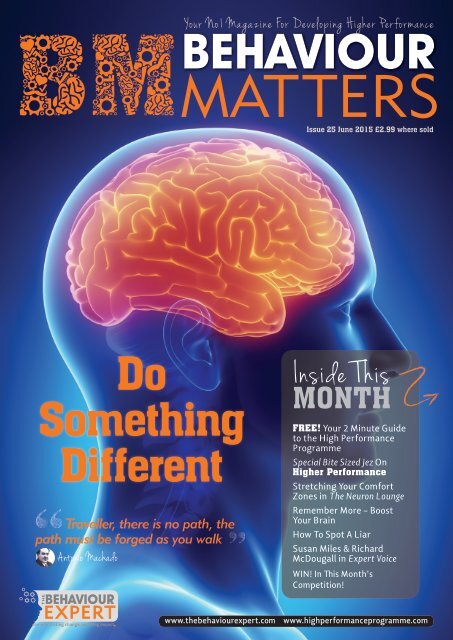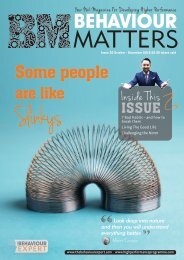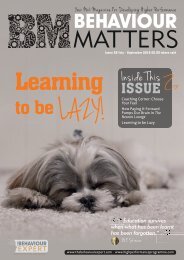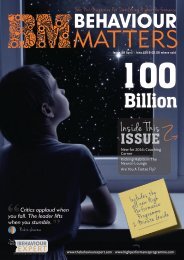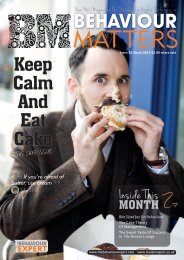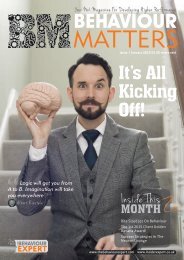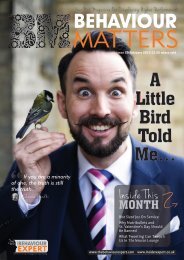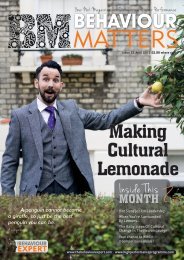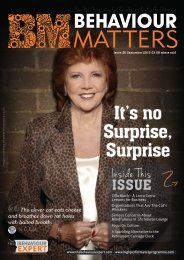Behaviour Matters June 2015
You also want an ePaper? Increase the reach of your titles
YUMPU automatically turns print PDFs into web optimized ePapers that Google loves.
Your No1 Magazine For Developing Higher Performance<br />
BEHAVIOUR<br />
MATTERS<br />
Issue 25 <strong>June</strong> <strong>2015</strong> £2.99 where sold<br />
Do<br />
Something<br />
Different<br />
Traveller, there is no path, the<br />
path must be forged as you walk<br />
Antonio Machado<br />
Inside This<br />
MONTH<br />
FREE! Your 2 Minute Guide<br />
to the High Performance<br />
Programme<br />
Special Bite Sized Jez On<br />
Higher Performance<br />
Stretching Your Comfort<br />
Zones in The Neuron Lounge<br />
Remember More – Boost<br />
Your Brain<br />
How To Spot A Liar<br />
Susan Miles & Richard<br />
McDougall in Expert Voice<br />
WIN! In This Month’s<br />
Competition!<br />
www.thebehaviourexpert.com<br />
www.highperformanceprogramme.com
A Thought From Jez<br />
I<br />
’m sat watching loads of bees buzzing around one of my<br />
favourite plants in our garden; it’s a broom, bursting with<br />
bright yellow flowers, which the bees seemingly can’t get<br />
enough of. I love bees.<br />
2<br />
I read a fascinating article about bees in<br />
California that are literally herded from one<br />
blossom plantation to another, to pollinate<br />
them and produce honey. They are driven<br />
hundreds of miles up and down the coast<br />
of America to keep producing honey and<br />
pollinating the plants; essentially forced labour<br />
for bees. However, it’s beginning to have a<br />
detrimental affect on the health of the bees –<br />
the apis equivalent of office stress I guess.<br />
I remember that song from Snow White and<br />
the Seven Dwarves: “busy doing nothing,<br />
working the whole day through, trying to find<br />
nothing to do”. Those dwarves had no focus.<br />
But the bee is an incredible thing, with a body<br />
weight that defies any mathematical workings:<br />
technically it shouldn’t be able to fly as it’s wing<br />
span isn’t sufficient to support it. Yet it does<br />
(and very well, too), all whilst being one of<br />
the most productive of all living creatures on<br />
planet Earth. Well, I’ve been very much a bee<br />
recently, not an unfocused dwarf.<br />
As you can probably tell by the weight, this is<br />
a very special edition of <strong>Behaviour</strong> <strong>Matters</strong>.<br />
It marks almost 3 years since I wrote the<br />
first issue and coincides with celebrating the<br />
launch of a brand new, online information and<br />
training hub, designed to help individuals and<br />
organisations develop higher performance.<br />
It’s called the High Performance Programme…<br />
I was up all night thinking of that name! You’ll<br />
find a handy 2 minute guide included but<br />
that’s not the only culprit to the added weight;<br />
we’ve packed a few extra pages in this special<br />
edition, too!<br />
It also marks the start of our new quarterly<br />
distribution for <strong>Behaviour</strong> <strong>Matters</strong>: I know<br />
The Golden Pineapple Award<br />
This month’s Client of the<br />
Month and the recipient of<br />
our Golden Pineapple Award<br />
badge is Jacquie Beagan!<br />
Very often foreword thinking, dynamic<br />
individuals are recognised here, however,<br />
Jacquie has had to make some difficult<br />
decisions and lead her team through some<br />
challenging and busy times. Jacquie’s focus<br />
is laser sharp and she knows what she wants<br />
and how to get there but of course that’s<br />
only half the solution. The main barrier most<br />
people face is getting their team to act;<br />
to want to achieve the goals they set. And<br />
Jacquie Beagan, Merck Serono<br />
C lient of the Month<br />
that’s where Jacquie’s sincere, inclusive and<br />
encouraging approach has helped her and<br />
her team to achieve some fantastic results,<br />
all while motivating them to continue to<br />
do so. I imagine it hasn’t always been easy,<br />
however, her focus on working as one team<br />
with a clear goal in mind has ensured her<br />
team remain positive, focused and more<br />
determined than ever.<br />
Look out for your Golden Pineapple Award<br />
badge in the post!<br />
you’re all very busy and many of you don’t find<br />
time to properly read and digest the contents<br />
each month, so the next edition will land on<br />
your desks in September and then after that<br />
every three months. If you’ll miss your monthly<br />
dose, make sure you’re signed up to my<br />
monthly email “From My Brain to Your Inbox”,<br />
which is a bit of fun and includes a regular dose<br />
of interesting brain tricks and behaviour fixes.<br />
Dive into this very special edition and as<br />
always, don’t hesitate to get in touch, I always<br />
love hearing from you.<br />
www.thebehaviourexpert.com<br />
www.highperformanceprogramme.com
Inside Jez’s<br />
Brain<br />
Liar, Liar, Pants On Fire<br />
Just last week I was sat in a meeting watching<br />
someone lie through their teeth about how<br />
they had not only completed a project but also<br />
done a significant amount of research for it, too.<br />
Only the completed project wasn’t with them because – and here<br />
comes the emotional tug on the heart strings – there was a computer<br />
problem and then an incident with a cat and some coffee and a baby<br />
crying and a family breakdown and then an argument and then<br />
something else about the baby and then a problem with the fish. It<br />
was heartbreaking. It was Oscar-winning. It was all lies.<br />
The others around the table bought into the story and extended the<br />
deadlines, made a lot of calls to rearrange the workload and enable<br />
things to continue without the required details and content from the<br />
project. I was put in a compromising position because I knew that<br />
the individual had made all but one of the things in her story up (the<br />
cat really did knock over the coffee cup). How did I know? Because<br />
truth detection and the science of uncovering untruths is a personal<br />
interest of mine and over the past ten years or so I’ve read a lot of<br />
literature, attended quite a few lectures and befriended quite a few<br />
specialists in the field of lying – years ago I used to give a lecture<br />
about how to spot a liar – and how to flush one out!<br />
Contrary to popular belief, liars tend to give themselves away more<br />
through what they say rather than their body language. Their normal<br />
speaking pattern will be different, so look out for changes to the way<br />
in which they speak; either sped up or cautiously forming sentences,<br />
for example. Most liars will commit less, say less and speed up<br />
There are subtle tell-tale signs that our<br />
bodies do, which give us away, too.<br />
when lying, so as to incriminate themselves as little as possible and<br />
to get the lie over with as quickly as possible. Listen to elements of<br />
discomfort, too: regular breaks in the voice, a less uniform tone and<br />
changes to the words that they use. For example, in the famous lying<br />
studies, most subjects spoke about other people or things more than<br />
themselves, when they were lying.<br />
There are subtle tell-tale signs that our bodies do, which give us<br />
away, too. Our feet often subconsciously point towards the exit in the<br />
room, our fingers fiddle and there is an increase in facial touching.<br />
When we smile naturally, responsively, as a result of feeling happiness<br />
or sensing something amusing, our smiles appear quickly and<br />
symmetrically. The muscles instinctively and automatically create<br />
that visual response – take a look for yourself the next time you make<br />
someone laugh: their smile appears without reservation. However, a<br />
false smile is slower and lopsided or crooked; it’s not natural.<br />
Where you can consciously control your heart rate, your bladder and<br />
indeed your brain, the movement of your eyes (pupil dilation and<br />
rapid eye movement, for example) is one of the few reactions in your<br />
body over which you have absolutely no control. Our eyes give us away<br />
more than you could ever possibly imagine. When we are nervous<br />
our eyes often move rapidly and as we grow more uncomfortable<br />
with the lie we are telling, our heart rate increases and as a natural<br />
response, our pupils dilate. It has also been observed that people’s<br />
eyes will often dart towards the exit of a room as subconsciously they<br />
want to remove themselves from the lie and thus the environment<br />
they’ve found themselves in.<br />
Despite a lot of pop psychology information written on lying to<br />
the contrary, and despite the fact that most of our registered<br />
communication is actually non verbal (a whopping 55% of the way<br />
that we relate to each other is via body language: facial expressions,<br />
posture and gestures and 38% is attributed to how what we hear<br />
sounds; the volume, intonation etc) the very best way to catch out<br />
a liar is to listen to what they say. The math whizz readers will have<br />
calculated that just 7% of how we relate to each other and effectively<br />
communicate is down to the words that we use.<br />
The important point, before you start brandishing people a liar for<br />
simply scratching their nose, is that all of these points need to be<br />
taken in context. It’s unlikely that you’ll see any one of these signs in<br />
isolation (which does help with our itchy nosed colleagues).<br />
Don’t Forget...<br />
Join me on twitter @JezRose<br />
for succinct advice, fun and<br />
SPECIAL OFFERS!<br />
3
4<br />
The Neuron<br />
Stretching Your C omfort Zones<br />
That’s<br />
Steve<br />
Wozniak with<br />
me (I’m on the<br />
left). It’s not often<br />
that you get<br />
to meet and chat<br />
to a living legend,<br />
so in that respect,<br />
it was a very special<br />
day for Steve.<br />
Shortly after that<br />
photo was taken,<br />
he turned to<br />
me and said: “this<br />
might very well<br />
be the highlight of my career” and I, naturally, had<br />
to agree with him. I have, after all, been invited onto<br />
Gloria Hunniford’s Heaven and Earth show.<br />
Steve was speaking at a conference I was also attending and he had some<br />
truly fascinating things to say about his life and career; the formation of<br />
Apple computers and how, since he’s left, he has to queue like the rest<br />
of us to get the latest iPhone! Over the past 12 years traveling the world<br />
speaking at conferences and training events, I’ve met a lot of people; a<br />
really wide variety: some wildly creative, others incredibly talented and<br />
some super intelligent, too. But Steve Wozniak tops the geek charts,<br />
as he casually explained how he was just playing around with some<br />
Research has shown that the most effective<br />
way to break habits is by wanting to<br />
electronic components one night trying to see what he could come up<br />
with, you know, like we all do, and he created something that he realised<br />
could create and record binary code that, when a screen was added and<br />
built into this complex bundle of wires and components, could create<br />
letters and numbers on the screen. He’d built the very first portable<br />
computer. Puts your Saturday night in with a bottle of Sauvignon Blanc<br />
and a family bag of Minstrels to shame, doesn’t it? He went on to reveal<br />
that it was Steve Jobs who had the business, entrepreneurial and<br />
www.thebehaviourexpert.com<br />
www.highperformanceprogramme.com
commercial talents; Wozniak (or Woz as he likes to be called) was happy<br />
just playing about with wires and was already onto working out that he<br />
didn’t even need to build the monitor into the components: he could<br />
simply plug in an external monitor – or even television – to create a truly<br />
portable computer. The “PC” we all know today exists because of Woz.<br />
And of course thanks to Jobs’ ability to promote and market it.<br />
Now, I’ve summed the whole thing up for the sake of brevity. It took a<br />
while of course to get things right and to get the computer working,<br />
however, in the very beginning it was Steve Jobs and Steve Wozniak<br />
making these computers to order in their garage. A true back bedroom<br />
(or garage in this case) start-up company. Now look at them; it’s recently<br />
been valued at just over 1 trillion dollars. Yes – trillion. No, I didn’t know<br />
you could get a trillion either. I asked Woz how, although on reflection<br />
perhaps I should have asked him why, and he said: “you’ve got to dare<br />
to do something differently; that’s what we did at Apple – we spotted a<br />
gap in the market and moved into it, regardless of whether others had<br />
spotted it, too because we wanted to create things that people wanted.<br />
To do that we simple made a point of seeking out knowledge in areas<br />
that others weren’t seeking it in, in order to stand out”. Then he said<br />
something that really resonated with me: “You can do things that have<br />
but just how easy it is – because they are self-limiting and entirely<br />
fictitious: comfort zones are very often perceived, not at all real and very<br />
much a product of what we anticipate may or may not happen, based<br />
on insufficient information. In short, comfort zones are often based on<br />
our opinion about things, which we know nothing about. It can be really<br />
simple things that help us to move out of our comfort zones: reading a<br />
different book, taking a different route to work or walking the dog on a<br />
different path, or simply taking a moment before you act to consider the<br />
alternative actions or options available to you. That’s at one end of the<br />
spectrum, then at the other you can simply remember that a comfort<br />
zone is really a habit. Ask yourself these questions: What is it that makes<br />
you comfortable by repeating that particular behaviour? Why do you<br />
always opt for the same things inside your comfort zone? Who are the<br />
people around you? What time of the day do you tend to do them? Each<br />
time you do things that are very much inside of your comfort zone,<br />
ask yourself these questions and then look for a pattern: perhaps you<br />
always do the same things because it makes you feel safe, or confident.<br />
Perhaps it’s because there are people there you like to socialise with.<br />
Now look for alternatives that produce the same reinforcement: what<br />
else could you do that would still make you feel confident, or safe, or<br />
that would allow you to socialise?<br />
Lounge<br />
5<br />
not been done yet but you’ve got to be willing to move outside of your<br />
comfort zone.” It’s the old adage: if you do what you’ve always done,<br />
you’ll get what you’ve always got. Repeating the same behaviour yet<br />
expecting different results is the definition of insanity. However, it’s not<br />
always that simple to just “do things that haven’t been done yet”, or “do<br />
something differently” because we are fundamentally creatures of habit<br />
and while making habits is simple and often subconscious, breaking<br />
them can be somewhat tricky (despite that fact that it is actually almost<br />
as simple as making them). In Be a Purple Banana I wrote about comfort<br />
zones - and in this month’s Extract From feature on page 6, you’ll be<br />
able to read why it’s sometimes so difficult to move outside of them<br />
Research has shown that the most effective way to break habits is by<br />
wanting to. The truth is that there are thousands of ways to change<br />
habits and you need to find the right one for the circumstance and<br />
behaviour, however, ultimately if you believe that you can change; if you<br />
make changing, a habit, the change becomes real because ultimately<br />
our habits are what we choose them to be.<br />
To accomplish great things we must<br />
not only act but also dream. Not only plan<br />
but also believe<br />
Anonymous
Extracts Fr om<br />
6<br />
Three questions<br />
(well,<br />
technically two as one is repeated<br />
twice, although in a<br />
different context), that are<br />
unnervingly simple, yet can<br />
make a significant impact<br />
on the way that we approach<br />
challenges, respond to opportunities,<br />
create opportunities,<br />
think, behave and<br />
adapt. These three questions (I know it’s two) can<br />
help shape your ability to think differently. I appreciate<br />
that sounds a little ethereal, however,<br />
something quite amazing is happening in your<br />
brain, I dare say right now.<br />
I am quite obsessed by the brain. It’s an absolutely astounding organ,<br />
yet we pump our bodies with alcohol, tobacco and drugs, which all have<br />
a detrimental affect. I say we; I mean you – and by you, I mean a vast<br />
generalisation, not necessarily specifically you. I don’t drink alcohol, nor<br />
smoke. However, if we were to conduct a functional Magnetic Resonance<br />
Imaging (fMRI) scan of your brain right now (that’s the one you might<br />
have seen on television, where they lay the person flat on their back<br />
as they’re slid into what looks like a giant plastic doughnut), we would<br />
be able to see, highlighted in various colours, where the activity in your<br />
brain was at any given moment. We’d be able to ask you questions, pose<br />
conundrums for you to consider and ask you to imagine things, so that<br />
we could see which areas of your brain were activated by the different<br />
tasks. Following that scan, if I were to ask you to start challenging things<br />
more often, by asking “why do we do it this way?” and to then follow that<br />
question up with another: “how can we make this better?” You would<br />
begin, very gradually, to change the way that you think. You’d begin to<br />
approach things differently. If after a period of time, say three or six<br />
months, we repeated the fMRI scan and I asked you the same questions,<br />
we’d notice changes. Your brain would be functioning differently, purely<br />
as a result of how you approach things, as a direct result of the language<br />
you’d been using. Remarkable isn’t it? We have the power to literally<br />
rewire our brain’s neural circuitry. If you’re at all surprised, interested<br />
or gob-smacked right now, this is exactly the problem I have with the<br />
Bite Sized Jez<br />
On Performance<br />
scientific community. In writing this<br />
book, it is, in truth, the beginning of a<br />
crusade to make more people aware<br />
of some of the remarkable advances<br />
and understanding in psychology and<br />
human behaviour, which seem to be<br />
rarely shared with the general public.<br />
Yet it’s so important because with<br />
this level of understanding, even at a<br />
primitive level, we are better able to<br />
understand just how capable we are,<br />
how to change our behaviour and<br />
why it’s important, too.<br />
Over the past twenty or so years,<br />
so much has been learned about how we behave and it’s unlocked<br />
some serious questions about human potential. For example, we now<br />
understand that our behaviour today is not concrete: who we are as a<br />
person; the things we stand for, believe in, the way that we behave<br />
and think is not permanent. This means that we could be somebody<br />
completely different in six months than who we are today. It’s both<br />
enlightening and encouraging to know that we can change something as<br />
significant as the way our brain behaves. Of course, many aspects play<br />
a role in this and both accentuate and prevent this potential, whether<br />
they are genetic or environmental, for example. However, this is exactly<br />
why we should challenge things more often and ask why it is that a<br />
particular process or activity is conducted in a certain way. That question<br />
alone is useful (“why do we do it this way?”) but becomes significantly<br />
more powerful when coupled with asking how the very thing you are<br />
challenging could be improved (“how can we improve it?”).<br />
By Jez Rose, published by Dr. Zeus Publishing<br />
And that’s where we’re<br />
cutting you off!<br />
This is the last ever Extract From<br />
feature. Be a Purple Banana is<br />
now available for you to buy on<br />
Amazon.co.uk<br />
Humans have a tendency to define things by what they are not: not good enough, not smart enough, not<br />
extraordinary enough. Focus on the things that are real - what have you got? What can you do? Build a greater you<br />
by enhancing your natural talents, expanding your skillset or knowledge and embracing the things you do well, not the<br />
definition based on another person. Ask a friend or colleague to list all of your talents – your opinion is often skewed!<br />
www.thebehaviourexpert.com<br />
www.highperformanceprogramme.com
Amazing breakfast (again)<br />
at St Pancras Renaissance<br />
Heidel berg, Germany<br />
Hanging out with “ The Marriotts”<br />
Around The World<br />
Jez spends as much as 200 dates a year away working, so we thought<br />
we’d share some of the beautiful, unusual - and frankly bizarre - sights<br />
Jez sees here with you. And no photo montage would be complete without a<br />
caption competition!...<br />
With Jez<br />
7<br />
Amazing breakfast at<br />
The P ig In The Wall, Southampton<br />
Win!<br />
Caption Competition!<br />
We’ve got a stack of business books to give away<br />
that will help you develop your own higher<br />
performance, featuring The Sales Bible, Delivering<br />
Happiness, Rich Dad Poor Dad, Disney-U and The<br />
Chimp Paradox. All you need to do is send in your<br />
suggested caption to the photo above to<br />
competition@thebehaviourexpert.com<br />
before 1st July<br />
1 winner will be chosen<br />
at random.<br />
More Tea, Vicar? Kuwait
8<br />
Bees Cannot Fly<br />
by Roger McGough<br />
Bees cannot f ly, scientists have proved it.<br />
It is all to do with wingspan and body weight.<br />
Aerodynamically incapable of sustained f light,<br />
Bees simply cannot f ly. And yet they do.<br />
There’s one there, unaware of its dodgy ratios,<br />
A noisy bubble, a helium-filled steamroller.<br />
Fat and proud of it, buzzing around the garden<br />
As if it were the last day of the spring sales.<br />
Trying on all the brightest f lowers, squeezing itself<br />
Into frilly numbers three sizes too small.<br />
Bees can f ly, there’s no need to prove it. And sting.<br />
When stung, do scientists really believe it?<br />
READING<br />
Into It<br />
Jez drinks tea – a lot. And he reads<br />
– a lot. His work library has more<br />
than 3,000 books in it so each month we bring<br />
you more recommended reading material. Grab a<br />
cup of tea and get your brain into the book that’s<br />
tickling his thalamus this month…<br />
Moonwalking With Einstein<br />
by Joshua Foer £9.99 ISBN 9780141032139<br />
You might know that I’m training my memory. I’m learning to<br />
remember things and build my memory muscle. Can anyone get a<br />
perfect memory? Joshua Foer used to be like most of us, forgetting<br />
phone numbers and mislaying keys. Then he learnt the art of memory<br />
training, and a year later found himself in the finals of the US Memory<br />
Championship. He also discovered a truth we often forget: than, even in<br />
an age of technology, memory is the key to everything we are.<br />
This book is just brilliant. It’s as fascinating as it is insightful. Foer takes<br />
us on an astonishing journey through the mind, from ancient memory<br />
palace techniques to neuroscience, from the man who can recall nine<br />
thousand books to another who constantly forgets who he is. In doing<br />
so, Foer shows how we can all improve our memories.<br />
Star Rating:<br />
We’ve got 10 £10 vouchers<br />
for Waterstones to send to the first<br />
10 people to email us at<br />
competition@thebehaviourexpert.com<br />
with the subject line BOOK GIVEAWAY<br />
before 1st July<br />
On Performance<br />
Bite Sized Jez<br />
One of the most effective ways I’ve found to motivate myself in the morning (after tea, dog cudd les and<br />
a shower), is by planning the day: listing all the things that would make me happy, brighten my day or inspire or motivate<br />
me if I achieved them. Obviously there are necessary things on the list but as long as there are things that I know will<br />
give me a great sense of satisfaction when they’re complete, it drives me forward. Direction and purpose.<br />
www.thebehaviourexpert.com<br />
www.highperformanceprogramme.com
www.highperformanceprogramme.com<br />
HIGH<br />
P R O G R A M M E
Expert Voice<br />
Richard McDougall is an expert in body language<br />
and communication, with more than 10 years experience<br />
coaching individuals and teams. He is also<br />
one of the most respected magicians in the world.<br />
Name of the Game<br />
meant that there came a time when there was real understanding and<br />
appreciation of what he was telling us.<br />
As I sit here and write this, I can hear his voice saying one of his many<br />
phrases that were short, simple and mathematically correct:<br />
“The name of the game is communication.”<br />
10<br />
It is very important to have a mentor. Someone who can listen, guide<br />
and offer honest but accurate feedback. I was very fortunate that I met<br />
mine when I was 13, and he stayed my mentor for over thirty-five years,<br />
until his death almost exactly a year ago as I write this.<br />
Alan Alan was extraordinary. After starting out in show business<br />
performing magic, a love of which he never lost, he made his name<br />
as an escapologist: his act involved being handcuffed and wrapped in<br />
chains, which were padlocked by two members of the audience. His<br />
feet were tied to a rope, and the rope was pulled up into the air, with<br />
Alan dangling beneath. In a circus or theatre, this was to the top of the<br />
building. Outside, it might be from a crane or from a helicopter. His aim<br />
was to get out of the handcuffs and chains. Oh, and the rope was on<br />
fire... and when he worked in the circus, the lions were let loose into the<br />
ring beneath him.<br />
His death-defying, iconic act made him one of the highest paid<br />
speciality acts in the world and for thirty years, he was in constant<br />
demand around the world. During that time, he worked with some of<br />
the greatest performers on the stage, and some of the smartest minds<br />
behind the scenes in theatre and television. He was close friends<br />
with some of the most brilliant magicians of the 20th century, and<br />
all that knowledge, coupled with his own forensic analysis of every<br />
moment in a theatrical act, gave him a deep and profound insight<br />
on successful performance. It was this approach to deconstruction<br />
and understanding, based on acute observation that he passed so<br />
generously to a group of just four or five of us.<br />
We used to visit Alan in his flat towards the end of his working life and<br />
many times during his long retirement, and he would play film clips of<br />
performers like Sinatra, Judy Garland or Pavarotti. He would freeze the<br />
action, and ask us about the impact of their persona, and the methods<br />
they had used to connect with us. He talked about posture, the beats<br />
of silence between words, how to convey authenticity through the<br />
eyes; how to make sure that everyone felt they were being looked at,<br />
even in an audience of thousands.<br />
We watched Charlie Chaplin and Laurel and Hardy, Eric Morecambe – in<br />
fact anyone who was at the top of their game, and the same questions<br />
were asked. At that time, many of us were still in our teens, and these<br />
concepts took a long time to be understood, but the sheer volume of<br />
excellence we were exposed to, as well as the other end of the scale,<br />
It is true whether you are performing magic for just a few people, or an<br />
act like his, on a stage in front of thousands. It is especially also true,<br />
however, in business. The name of the game is communication. Whether<br />
it’s a business meeting, pitch, internal meetings, large presentations or<br />
meeting just one client, it all comes down to communication. I am not<br />
sure if it is arrogance or ignorance, although I suspect a little of both,<br />
that so little time or effort is expended on arguably the most crucial skill<br />
in business: understanding how to explain, persuade, negotiate, inform<br />
or sell, with clarity, simplicity and authenticity. It should be mandatory<br />
for everyone. Doctors with patients, staff with customers; all would<br />
improve business relationships by placing greater importance on<br />
listening skills and confident communication. Knowing how to engage<br />
an individual or a large group - and keep them engaged, would save<br />
literally millions of hours and pounds which are currently wasted on<br />
conferences in high cost venues that are crippled by presentations that<br />
have been delivered with no impact. As a sign of the low faith companies<br />
have of their presenters at a conference, most presentations will have<br />
the screen centre stage, and the speaker to the side. As a sign of the<br />
low confidence of presenters, most of them are happier presenting like<br />
this, and would be even more terrified the other way round.<br />
The most successful performers are always the best communicators.<br />
They may not be the most talented or have the best product, but<br />
they have found a way to engage with their customers that their<br />
competitors have not.<br />
I am sure we have all met someone in business and either immediately<br />
felt comfortable with them, or the hackles have been raised. Far fewer<br />
have perhaps stopped to analyse what has caused such visceral reaction.<br />
Fewer still have probably stopped to consider what impact we are<br />
having on those around us. If we did, we would realise that verbal and<br />
non-verbal communication have enormously more significance than we<br />
generally pay attention to, and that we can always improve these skills<br />
and reap greater rewards. It may sound a little trite to say, but how we<br />
communicate not only affects outcomes. It can also affect incomes.<br />
So start observing people closely today. Observe yourself, or ask<br />
your mentor how your style of communication is perceived. They<br />
don’t have to be an escapologist or from show business, they just<br />
have to be honest and accurate. Remember, the name of the game is<br />
communication. However you look at it, there is no escaping it.<br />
www.thebehaviourexpert.com<br />
www.highperformanceprogramme.com
8SIMPLE WAYS TO BE<br />
STRESS-FREE<br />
Look after yourself.<br />
We adopt the most<br />
common emotion that<br />
surrounds us, so start<br />
hanging around with<br />
positive people.<br />
Get help.<br />
We’re only human and simply<br />
can’t take on everything. Take some<br />
time off work if need be to sort things<br />
out but do it sooner rather than<br />
later: manage stress before<br />
it begins to manage you.<br />
Take 30 minutes every day to<br />
do something for you: walk the<br />
dog, read a book or go for a<br />
swim. It should be something<br />
you enjoy doing; sacrosanct<br />
time for you to enjoy, during<br />
which you switch off and relax<br />
– so no jogging while on<br />
your Blackberry!<br />
You are 10,000 times more<br />
important than you think you are.<br />
Your organization is about you<br />
– you’re a really important asset.<br />
Without the people inside your<br />
organization that make it<br />
happen every single day, it<br />
wouldn’t function.<br />
If you use ”I’m too busy” or<br />
“there isn’t enough time” as<br />
excuses, I guarantee we can<br />
fix that right now as they are<br />
common problems resulting<br />
from poor time management.<br />
Brighten up your workspace with<br />
a plant, photos of family, friends,<br />
pets or anything that has a<br />
special memory. Keep your<br />
working area tidy and free from<br />
clutter: if you clutter your desk,<br />
you clutter your mind.<br />
Recognise the signs of when<br />
stress is beginning to take over,<br />
which include irritability; loss of<br />
appetite; butterflies and anxiety;<br />
tearfulness and insomnia.<br />
Embracing change isn’t<br />
something humans are often<br />
particularly good at. The innate<br />
fear of failure we have takes over,<br />
as change often means the<br />
unknown. If you feel yourself<br />
getting worried, ask questions you<br />
need to help put your mind at rest.<br />
www.highperformanceprogramme.com<br />
www.thebehaviourexpert.com<br />
HIGH<br />
P R O G R A M M E
12<br />
Expert Voice<br />
‘A fish rots from the head’<br />
Steve Penson from Alisar specialises in helping<br />
organisations to harness powerful profiling<br />
and create high performing teams that realise<br />
their potential… and is a friend and colleague.<br />
‘A fish rots from the head’ (We advise standing up wind) Why the fish?<br />
Well, have you ever seen an avalanche crashing UP-hill? No, we haven’t<br />
either. Mother Nature knows the best way to cascade is downwards.<br />
So our team working involves senior members first. Bring them in from<br />
the get go, get them using the right language and truly understanding<br />
the benefit of what we’re doing and our job becomes a whole lot easier.<br />
Discussions kick off around the High Performing Team model. We can’t<br />
take credit for the model, that’s down to Harvard Business School and<br />
Tavistock Institute – and they certainly know what they’re talking about.<br />
In a nutshell it says three key components grow highly effective teams:<br />
• Skills: Technical and Interpersonal (including Communication;<br />
Problem Solving; Conflict Management)<br />
• Accountability: Individual and Team<br />
• Commitment: Clear strategic vision; Roles and Responsibilities;<br />
Common working practices.<br />
It’s constantly surprising to find how often these basic team building<br />
blocks aren’t as solid as they should be.<br />
Let’s look at Roles and responsibilities. Frequently discussions around<br />
this topic begin with people quoting their job descriptions, often only<br />
part of the story, as roles and responsibilities blur, particularly within<br />
matrix management structures.<br />
Illuminating sessions<br />
Some very illuminating sessions uncover the (sometimes yawning)<br />
chasm between what people think their role is and what they believe<br />
others roles to be. We also use the powerful Everything DiSC® model<br />
to help teams understand their behaviour, and improve relationships<br />
across the team and their organisation. The DiSC® contextual profiling<br />
tool asks people questions based on their role, such as: “What kind of<br />
person am I?” and “Why don’t I get the reactions I’m expecting?”<br />
It enables people to get to know their default behaviours, recognise<br />
the behaviour of others and how certain behaviours manifest in<br />
certain personality types. Learning to flex your behaviour means you<br />
get the best out of yourself and others, and makes your interactions<br />
much more effective.<br />
Instant hits<br />
Board members are often astounded when we discuss the impact they<br />
have – sometimes even without leaving their office. We told one MD<br />
that his staff felt his shop floor appearances were simply done to point<br />
fingers and criticise. On his next walkaround he did a ‘stop and chat’…<br />
about last night’s soaps, the football results, even said “Cześć, jak się<br />
masz?” (How are you) to a Polish employee… which took some doing!<br />
His bonhomie was an instant hit. Morale improved, people started<br />
interacting more because they realised he was, in many ways, just like<br />
them. All we told him was “Be aware of the shadow you leave”.<br />
We like to play with language (we’re experienced NLP practitioners after<br />
all) and ‘reframing’ can have a profound effect. Here’s an example…<br />
At one of Ann’s recent coaching session someone told her they<br />
practised regular personal affirmations by saying “Being me is no bad<br />
thing” to themselves – a potentially good tool for shy and retiring types<br />
(so we’ve never suggested this technique to Jez!). Ann replied: “Let’s<br />
reframe that, try ‘Being me is a GOOD thing’”. Another instant success.<br />
The tone of voice changed, there was more energy, it was more<br />
believable, it’s more positive. What’s not to like?<br />
We firmly believe in the power of coaching. Giving someone undivided,<br />
one-to-one attention and the space and time to really think through what<br />
they’re doing and where they’re going. Then provide a personalised,<br />
bespoke development route. It works.<br />
The Alisar approach<br />
So, what’s the Alisar approach? It starts with a fact-finding mission,<br />
watching, looking, listening and learning. What’s actually happening?<br />
What really needs attention? Sometimes we compile a survey that asks:<br />
“What do you really need?” We never turn up thinking we’re the experts.<br />
It’s your business, you’re the expert -how can Alisar support you?<br />
Our fact finding is followed by a series of workshops to introduce<br />
general concepts, then we get down to business with one-to-one<br />
coaching. And cascade this process from senior level throughout<br />
the company. We continue the cascade from senior members to the<br />
next tier using exactly the same concepts, then the next… until we’ve<br />
worked with the entire organisation.<br />
Using a confidential questionnaire that demonstrated the real issues<br />
faced by a premium manufacturer, our work resulted in increased<br />
confidence amongst all team members and our recommendations and<br />
improvements helped to:<br />
• Eliminate inefficiencies in business processes and daily work<br />
schedules<br />
• Review, learn and improve what they did, which led to previous<br />
customers returning<br />
• Save the company down time and the cost of generic sales training<br />
• Transform the team into a more communicative, cohesive unit<br />
• Increase their sales closing skills.<br />
An injection of Alisar insights and the company became more efficient,<br />
customer focused, and on course to exceed their annual target by £100K.<br />
Find out more about the Alisar approach, visit our website at<br />
www.alisar.eu<br />
www.thebehaviourexpert.com<br />
www.highperformanceprogramme.com
9<br />
WAYS<br />
TO EMPOWER<br />
YOUR TEAM<br />
It’s a firm favourite of many but micro-managing is time consuming<br />
and ineffective. Strong leaders build strong teams around them<br />
through empowerment and trust. Here’s a quick overview of how:.<br />
Tell people<br />
What you want to achieve<br />
and involve them in<br />
finding ways to achieve it.<br />
Set out expectations<br />
Ensure everyone knows what their<br />
role is and what part they play.<br />
Use positive language<br />
And plenty of enthusiasm<br />
and encouragement.<br />
Highlight successes<br />
And show the<br />
way forwards,<br />
learning from<br />
failings.<br />
Provide mentors<br />
in the form of<br />
buddies or<br />
more formal<br />
coaching as<br />
required.<br />
Make individuals<br />
Personally<br />
accountable<br />
for their results,<br />
you want<br />
a professional<br />
team producing<br />
professional results.<br />
Ensure individuals<br />
Have the tools and equipment<br />
and training required to carry out<br />
their role fully and to the best<br />
of their ability.<br />
Seek high standards<br />
And then incrementally<br />
raise the bar.<br />
Recognise<br />
And reward successes<br />
but be mindful that<br />
individuals have different<br />
ways that they will want<br />
to be rewarded and<br />
which will motivate<br />
them to continue.<br />
www.thebehaviourexpert.com<br />
www.highperformanceprogramme.com<br />
HIGH<br />
P R O G R A M M E
Expert Voice<br />
Whose career is it anyway?<br />
14<br />
Sue Miles is Director at Chaseville Consulting<br />
Ltd, a people development consultancy specialising<br />
in professional services and the construction<br />
and property sector.<br />
www.chaseville.co.uk<br />
Have you ever been in an appraisal meeting with a ‘Waiting To Be<br />
Told’? Someone who wants you, their manager, to tell them what<br />
they want from their career, how to get it and what you are going to<br />
do to help them? This article aims to help you have a conversation<br />
with a ‘Waiting To Be Told’ (well before they walk into their appraisal<br />
meeting) about why they should care and not leave their career in<br />
anyone’s hands other than their own.<br />
Years ago I was pondering over a big life decision that I needed to<br />
make around my job and where I lived as a result. It was a hard<br />
decision – I asked friends their opinion, sought advice from family<br />
and, well, anyone who would listen to be honest. I think even a<br />
visiting dog had its ear bent one night (dogs, for the record, are<br />
great at listening but are pretty rubbish with answers). Finally, two<br />
months of prevarication and procrastination led me to a coffee with<br />
a good friend. His words were wise. “Sue, it does not matter how<br />
many people you ask, the decision is yours. No one cares as much<br />
about your job as you do. They are too busy worrying about their<br />
own life.”<br />
At first, I thought this was a bit harsh. People did care about me<br />
and my decision would impact on them too. One slowly sipped<br />
Americano later, however, and I realised he did not mean that<br />
people did not care about me, just that my life was my life. It was<br />
my decision to make.<br />
I tell this story because one of my big bugbears is people who want<br />
others to take responsibility for their career (or indeed in some<br />
cases their life, but don’t get me started on that one!) and I think<br />
his words ‘no-one cares about your job as much as you do’ are<br />
powerful. Depending on our own personal circumstances, many of<br />
us will be expecting to work in some form for about 40 years or<br />
more. Let’s say, for 8hrs a day. 330+ days a year for 40 years. That’s<br />
a lot of hours in our lives.<br />
Why then, do I meet so many managers that tell me that many<br />
of their team members come into appraisal/career planning<br />
conversations with a blank sheet of paper “waiting to be told” what<br />
to do with their career, or asking questions like, “what courses do<br />
you think I should go on this year?”<br />
If you are managing a ‘waiting to be told’, here are 6 compelling<br />
reasons to share with the individual to help explain why career<br />
ownership is important.<br />
(Before you read on, be clear that I am not saying that all employers<br />
should have a magic wand to grant us all our wishes. However, I do<br />
feel that individuals, whatever level, should be proactive enough to<br />
have an open conversation to explore options around opportunity,<br />
aspirations and personal growth. And leaders should be confident<br />
enough to have them.)<br />
Reason 1. As my wise friend says “no one care as much about your<br />
career as you do.” Not even the best manager in the world.<br />
Reason 2. Early in my career, I was told, “If you want to get on, make<br />
yourself as useful as you can to your line manager. Don’t give them<br />
work to do”. Simple advice from a senior Construction Director.<br />
Entering a career conversation (which is about their career!) with a<br />
blank sheet of paper, gives you (as their line manager) a job. It’s far<br />
more powerful for an individual to tell you what they want and for<br />
you to have an open conversation about what’s possible.<br />
Reason 3. Advice passed on to me by a wise CEO: “If you want to<br />
be considered for an opportunity you have to have ‘first thought<br />
status’ – i.e. you are the first person someone thinks of when<br />
they see or hear of an opportunity. If someone is a passenger<br />
in a career conversation, how will anyone, let alone you (their<br />
manager and personal advocate/major spokesperson) know what<br />
sort of opportunities interest them with customers/clients or in<br />
your own workplace?<br />
Reason 4. Some management books tell us that performance<br />
only makes up only 10% of success. This is often a shocker to many<br />
people who work hard and long hours. But it implies that “getting<br />
your head down and doing a good job” is just not enough. Wherever<br />
you work. It’s Harvey Coleman that tells us that 60% of success is<br />
made up of exposure and the remaining 30% is image and exposure.<br />
Whether or not you or they agree with the stats is not the point – it<br />
is just worth thinking about what turning up and ‘waiting to be told’<br />
could lead to…or not lead to.<br />
www.thebehaviourexpert.com<br />
www.highperformanceprogramme.com
Reason 5. Only they know what really motivates them. You are<br />
their manager, not a mind reader. Good managers will coach and<br />
guide and ask good questions, but it is not your responsibility to tell<br />
them what they want from their work life….it’s their responsibility<br />
to have given it thought.<br />
Reason 6. We are all constrained by ‘inhibitors’ at times – fear,<br />
procrastination, lack of confidence or self-belief etc. Even some<br />
of the most outwardly confident people I meet will often reveal<br />
something I would never have guessed upfront that can hold them<br />
back from taking action. One of the most compelling exercises I<br />
have used to get myself over my own fears has been to:<br />
• To ask myself what I want to look back on my life and say<br />
about it.<br />
• To consider what I might say about it right now.<br />
• To recognise the gap (if there is one) and make a personal<br />
plan to do something about it. Part of this will always include<br />
work stuff.<br />
That might mean making an uncomfortable phone call, doing a job<br />
I don’t like to achieve a longer term goal for me or taking a risk<br />
I would otherwise not take. Encourage them to know their own<br />
‘gap’ before they walk into a career conversation so they can have a<br />
conversation in the context of what they want.
News in Brief<br />
BUF F<br />
JUST ONE C ORNET T O…<br />
16<br />
You can read articles I’ve written about focusing<br />
on our goals and also reviews of my new book<br />
Be a Purple Banana this month in Forever Sports<br />
and Train magazines (think dumbbells not choo<br />
choo). Naturally they wanted someone ripped<br />
and buff to write for them and, well, couldn’t<br />
find anyone so asked me!<br />
F IBBERS<br />
According to HireRight, 57% of British job<br />
applicants lie on their CVs. Check out this<br />
month’s article on How to Spot a Liar to flush<br />
those fibbers out!<br />
ON THE WALL<br />
The writing is on the wall: 71% of UK adults<br />
think that businesses put profit before<br />
consumers. They’re probably right, too but<br />
it speaks volumes that the majority of your<br />
customers feel that way. Is it time to make our<br />
customers feel more valued?<br />
SHAP E MAT T ERS<br />
Why is it that triangular sandwiches always<br />
taste better than square ones?<br />
Well, not a Cornetto, per-se. Or at all in fact,<br />
I just love ice cream and there’s an Italian<br />
man sat next to me so it was the first thing<br />
that popped into my head. I’ve got just one<br />
space left in my coaching diary. If you’d<br />
like help achieving your goals, gaining or<br />
maintaining focus and unlocking the huge<br />
potential that’s in your mind, get in touch<br />
with Steph: jez@thebehaviourexpert.com or<br />
head here for more information: http://bit.ly/<br />
jezcoach<br />
Executive<br />
PROGRAMME<br />
Some more mental entertainment for your neurons...<br />
SCALE<br />
There is a clerk at the butchers shop. He is<br />
five feet, ten inches tall and he wears size<br />
eleven shoes. What does he weigh?<br />
TALL<br />
Before Mount Everest was discovered, what<br />
was the highest mountain in the world?<br />
REMEMBER?<br />
This is a fun memory assessment and<br />
training game, which has been turned into<br />
a drinking game on many occasions (not by<br />
me but it was inevitable that someone did,<br />
wasn’t it?!):<br />
Have someone lay out 8 or 9 different<br />
objects for example, a paperclip, a packet<br />
of tissues, a magazine, car keys, a glass etc)<br />
and cover them up. You’re given 30 seconds<br />
as soon as the cover is removed (I use a<br />
scarf or someone’s jacket) to look at the<br />
objects and remember as many as possible.<br />
Once you’re successful, try it with different<br />
objects but give yourself less time, then<br />
more objects and gradually less time. Voila!<br />
– instant memory trainer! You’re welcome.<br />
Do you know someone who’d love a copy of <strong>Behaviour</strong> <strong>Matters</strong>?<br />
Maybe a friend, colleague or least favourite child? Email their name and address to orders@thebehaviourexpert.com and<br />
we’ll post them a copy each month absolutely FREE! Ask us nicely in the email and we’ll also send you a little something in<br />
the post to thank you for helping us to widen distribution of <strong>Behaviour</strong> <strong>Matters</strong>.<br />
Contact The <strong>Behaviour</strong> Expert<br />
Midlothian Innovation Centre, The Bush<br />
Roslin, EH25 9RE<br />
www.thebehaviourexpert.com<br />
Join in the fun here!<br />
@JezRose<br />
www.facebook.com/thebehaviourexpert


